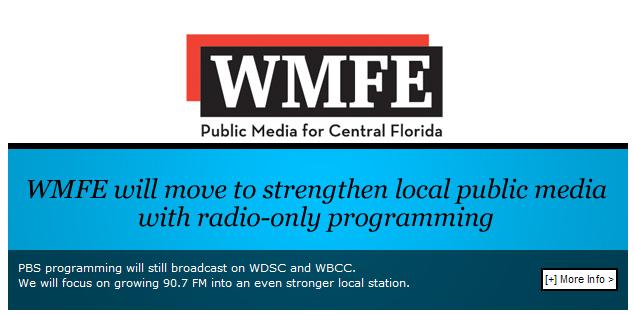Florida PBS Affiliate Sold to Religious Broadcaster

ORLANDO, FLA.: The Public Broadcasting Service has lost its second large-market member station since the year began. WMFE-TV in Orlando, Fla., has been sold to Dallas-based Christian broadcaster Daystar Television for $5 million, according to the Orlando Sentinel. Community Communications Inc., the nonprofit that runs WMFE’s TV and radio operations, said increasing financial pressure led to the sale of the television station.
“After careful consideration, we determined WMFE-TV is no longer financially viable,” management wrote. “Its revenue from local sources, membership and corporate underwriting are continually down while broadcast expenses continue to rise. At this rate, WMFE-TV threatened to drain WMFE-FM as well. The station has also faced increased competition from cable TV, multiple PBS stations in the Central Florida market and emerging media platforms.”
WMFE is one of three PBS affiliates in the area, along with WDSC-TV and WBCC-TV, all with transmitters located in Bithlo, a suburb east of Orlando. Coverage areas are “practically identical,” according to the station.
José A. Fajardo, WMFE president, said direct individual donations have fallen 40 percent and corporate giving is down 68 percent, since 2007. Donations from on-air pledge drives are down 34 percent. The TV station was $300,000 short of its fiscal 2010 fundraising goal, while the radio station reached its $230,000 goal ahead of schedule.
“We carefully evaluated a number of different options, including merging with another station or becoming independent, but none would have sustained the TV platform in the long run,” Fajardo said. “There are simply too many things negatively impacting public TV today, from shrinking financial support to steep PBS programming fees that we’ve been told are actually going up over the next two years. Given all of that, at least in our market, we think the model is no longer viable.”
As the primary PBS station in the market, Fajardo said WMFE paid nearly $1 million a year in PBS programming fees. He said the other two stations carry fewer network programs but also pay less than 25 percent of what WMFE pays.
Community Communications will retain its building. Five staff members were laid off April 1, when all fundraising efforts for the TV operation ceased. The sale is pending federal approval. WMFE plans to continue operating the TV station as a PBS member for at least another 90 days.
Orlando is the 19th largest TV market in the United States, with 1.45 million television homes. Earlier this year, PBS lost its main member station in the nation’s No. 2 market, Los Angeles, when KCET-TV dropped its affiliation. KCET went independent Jan. 1, 2011, after being the main PBS affiliate in Southern California for four decades, citing financial pressure brought on by a 40 percent fee hike from PBS.
PBS in the meantime faces funding cuts from the federal government. The House of Representatives voted in February to eliminate funding for the Corporation for Public Broadcasting, which in turn supports public TV and radio stations. The most recent budget funded the CPB for $410 million. Around 350 TV stations received $281 million for operations and programming. Radio received $94 million.
-- Deborah D. McAdams
See . . .
October 26, 2010: “KCET-TV Gets $1 Million to Go Indie”
Dues are based in part on a station’s fund-raising efforts, thus KCET’s dues went from $4.9 million to $7 million.
December 16, 2010: “KOCE-TV to Become PBS SoCal in 2011”
KOCE-TV is preparing for its ascendancy to becoming the primary PBS station in the Los Angeles market.
The professional video industry's #1 source for news, trends and product and tech information. Sign up below.
